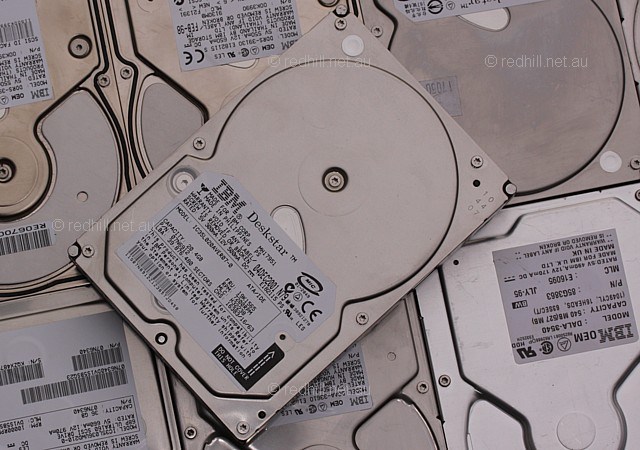
Photo: Red Hill.
IBM Deskstar 75GXP
Generally regarded as the fastest of all the 2000 model high-performance IDE drives, though to be fair the hands-on differences were really rather small. The obvious point of difference with the GXP was its maximum capacity — the biggest model in the range went up to a whopping 75GB.
The penalty for having this enormous amount of storage was performance: the larger units, with their need to move a greater number of heads, had a slightly higher seek time. Sharp-eyed readers will have noticed this before; Seagate's biggest SCSI drives, for example, have always had higher seek times than the smaller models becaise of the difficulty of moving the more massive head-stack of a multi-platter drive. As areal density increased over the years and the data tracks were squeezed ever-closer together, it became more and more difficult to position the read head precisely over the track.
In practice, very few people bought the biggest sizes of the 75GXP anyway — the 75GB monster cost almost as much as a 15,000 RPM SCSI drive — but the smaller sizes were affordable. The 20GB version usually seemed to cost more than a Seagate or a Western Digital, but the 30GB unit was excellent value. The real trouble was distribution: because of the failure of a major Australian wholesale company at around this time, IBM drives became difficult to find for a year or two. In consequence, the 75GXP sold rather poorly in Australia.
Overseas sources floated consistent stories of major reliability problems with the Deskstar 75GXPs, the 45GB model in particular, and the drive became the subject of a successful class action suit in the USA. Here we sold only a bare handful of 75GXPs. Of these, two arrived faulty but we believe that this may have been shipping damage. (In any case, like most manufacturers of most things, we are far less concerned about DOAs than we are about in-service failures. A DOA drive costs a few extra minutes in the workshop and some minor inconvenience; at worst, a delay of a day or two while you order a replacement unit. An in-service failure on the other hand, can result in customer data loss, significant inconvenience to them and cost to us, and it damages our reputation.)
Those aside, all our 75GXPs remained trouble-free, as did the replacement drives for our DOAs. None of our 75GXPs ever returned to the workshop: so far as we know all remained in service for the entire life of the machine that they were fitted to. Nor did we see any problem drives in third-party machines.
As always, our reliability ratings are based on our own experiences, nothing else, and while we sold only a very small number of GXP75s, we had no in-service failures with them, and saw none in third-party systems. Given the number of complaints we have seen about the 75GXP's reliability from overseas we would find it difficult to recommend the drive; nevertheless, our own limited experience with them was perfectly satisfactory and our cautious reliability rating of them reflects this.
Illustration: unfortunately, I don't have a Deskstar 75GXP to photograph. This is a Deskstar 60GXP, the subsequent model, which looked exactly the same.
| Performance | 1.49 | Reliability | AAX |
| Data rate | 444 Mbit/sec | Spin rate | 7200 RPM |
| Seek time | 8.5ms | Buffer | 2MB |
| Platter capacity | 15GB | Interface | ATA-66/100 |
| DTLA-307015 | 15.3GB | 2 GMR heads | |
| DTLA-307020 | 20.5GB | 3 GMR heads | * |
| DTLA-307030 | 30.7GB | 4 GMR heads | * |
| DTLA-307045 | 46.1GB | 6 GMR heads | |
| DTLA-307060 | 61.4GB | 8 GMR heads | |
| DTLA-307075 | 76.8GB | 10 GMR heads |